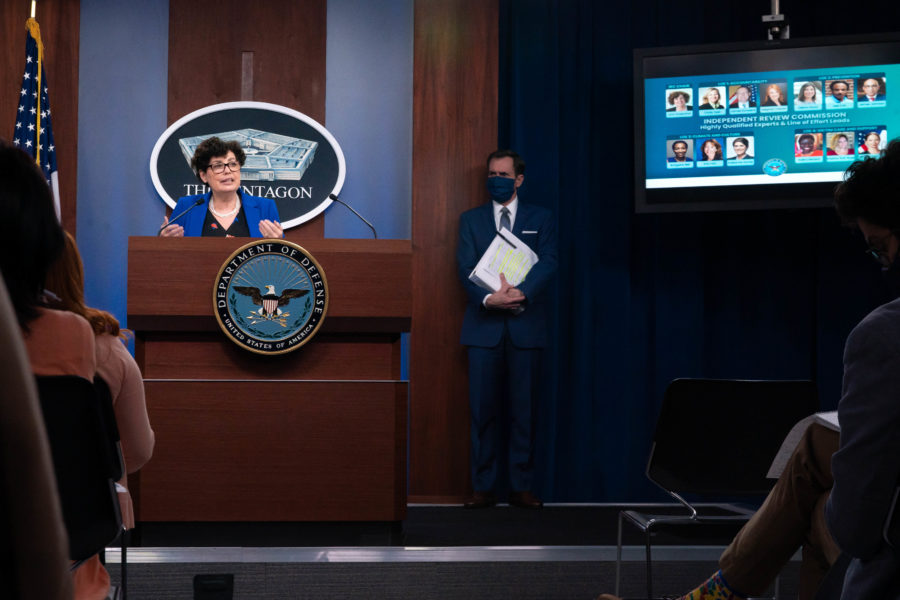The Pentagon’s independent commission to review sexual assault in its ranks has established its members and is looking at “big picture” items to change the military’s culture and prevent sexual assault.
The Independent Review Commission on Sexual Assault in the Military includes 14 members, the majority of whom are women and former military members, though none are currently serving, to ensure the independence of their discussions, the commission’s chair Lynn Rosenthal said in a March 24 briefing.
The commission met with Defense Secretary Lloyd J. Austin III and Chairman of the Joint Chiefs of Staff Gen. Mark A. Milley, and now has 90 days to review the history of sexual assault cases in the ranks to recommend large changes to address the problem, which Austin has established as a top priority.
Rosenthal said the goal of the commission is to drive “major shifts” in the Defense Department, as opposed to a long series of minor recommendations. The commission was first announced last month, and since then leadership has focused on finding the best members and structuring itself for independent discussions, while providing enough flexibility to include input from the Pentagon and across the military services.
The direction from Pentagon leadership is to look at every possible change, to include possibly removing cases from the chain of command, Rosenthal said.
“This is not a closed door,” she said. “The Secretary and the President have said all options should be on the table.”
The military needs to address deep cultural issues related to sexual assault, including myths about the extent of the problem, unhealthy views of women, and deliberate misunderstandings of the issues. This includes the prevalence of male sexual assault victims, and an over emphasis on how often there are false accusations, Rosenthal said.
The Senate Armed Services Committee on March 24 held a hearing on the issue of military sexual assault, with key lawmakers blasting the Pentagon for not making enough progress on the problem. The Pentagon’s most recent survey on the issue estimated that almost 21,000 service members had been sexually assaulted since 2018, said Sen. Kirsten Gillibrand (D-N.Y.).
“That makes them more likely to be raped by their fellow service member than shot by the enemy in war,” she said. “Since 2013, unrestricted reports of sexual assaults in the military have doubled, yet the rate of prosecution and conviction has halved.”
During the hearing, Sen. Elizabeth Warren (D-Mass.) asked Don Christensen, president of advocacy group Protect Our Defenders and a former chief prosecutor for the Air Force, if things had improved since changes to the Uniform Code of Military Justice were implemented in 2013 and 2014. Christensen replied that the situation has gotten worse.
“Military commanders have had their chance. They said they would fix it and they haven’t,” Warren said.
The Government Accountability Office, in testimony at the hearing, said that despite Congressional oversight and the Pentagon implementing more than 100 recommendations to address the issue, reports continue to rise.
“With the exception of some more recent initiatives, the department’s efforts have been largely focused on responding to, rather than preventing, incidents of sexual assault,” the GAO said.
Jennifer Hlad contributed to this report.
